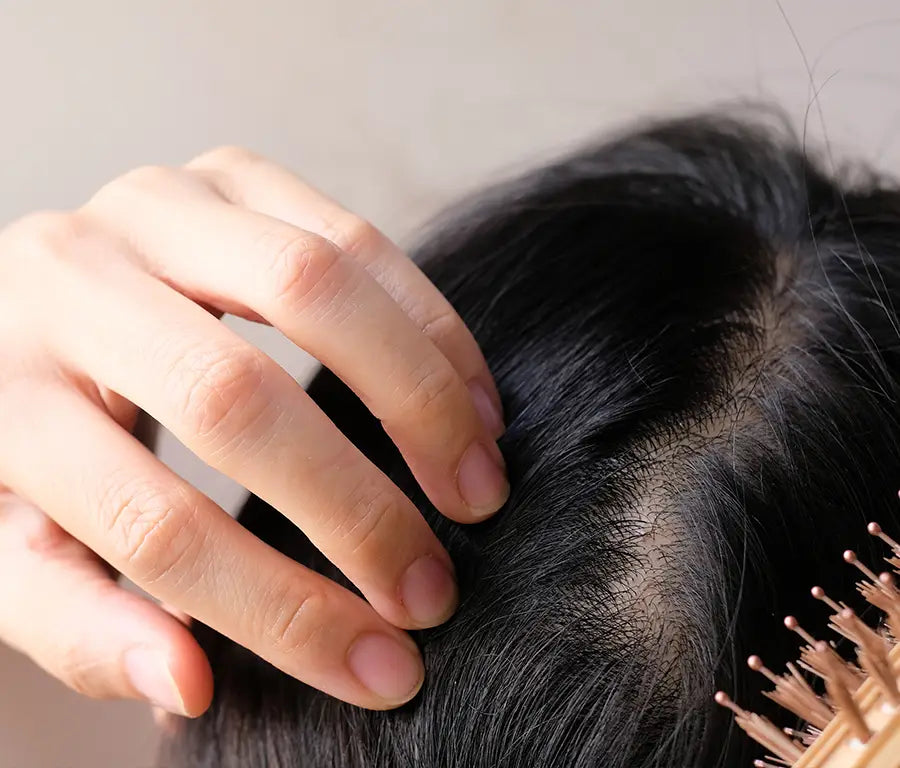Embarking on the journey of cancer treatment comes with both hope and challenges. Among the physical changes that patients can experience, one specifically, hair loss due to cancer or alopecia, stands out as a visible and emotionally impactful side effect.
This blog article aims to shed light on what cancer hair loss is like, exploring the types of hair loss, understanding the medications involved, and delving into possible preventive measures and support options .
What is hair loss due to cancer like?
As people go through cancer treatment, especially chemotherapy, they may face the distressing reality of hair loss.
Drugs used in chemotherapy are designed to attack rapidly dividing cells, a category that includes hair follicles. The resulting hair loss can be a temporary or permanent phenomenon, depending on the specific medications used and their doses.
The most prevalent type of hair loss during chemotherapy is anagen effluvium, a process that begins approximately 7-10 days after treatment and continues for a period of 2-3 months.
When does hair start to appear and how does it grow after chemotherapy?
As a general rule, approximately 1 to 3 months after completing chemotherapy treatment is when post-chemo hair begins to grow. And, normally, it takes 6 to 12 months for the hair to return completely.
During this period, in terms of how hair grows after chemotherapy, the new growth is likely to be:
- Thinner
- rougher
- Have a curly texture
- Present a different color
However, over time, hair tends to return to its normal state.
What type of cancer causes your hair to fall out more?
Hair loss due to cancer is not directly associated with the specific type of cancer itself, but rather with the treatments used to combat certain types of cancer.
The most common therapy that causes hair loss is chemotherapy . This treatment involves the use of powerful drugs that attack cancer cells, but also affect healthy, fast-growing cells, such as those found in hair follicles. Therefore, hair loss is a common side effect of chemotherapy.
However, not all types of cancer require this specific treatment, and some patients may undergo other treatment modalities that do not cause hair loss.
It is important to note that, in addition to chemotherapy, the emotional stress associated with a cancer diagnosis can also trigger a phenomenon known as telogen effluvium , which consists of greater hair loss than usual . In this case, hair may fall out temporarily due to changes in the hair growth cycle, although this loss is usually reversible over time.
Does hair fall out during all chemotherapy treatments?
Certain chemotherapy drugs, such as taxanes (paclitaxel and docetaxel) and anthracyclines (doxorubicin, idarubicin, epirubicin, and mitoxantrone), have been identified as more likely causes of alopecia.
Despite attempts to prevent hair loss, such as using cooling caps or immune treatments, achieving consistent success remains a challenge. Therefore, no treatment has yet been found to prevent hair loss with chemotherapy .
While chemotherapy takes center stage in discussions of hair loss during cancer treatment, radiation therapy to the scalp can also contribute to the development of alopecia .
Preventing chemotherapy-induced hair loss
Despite the fact that, as we have said, there is still no treatment to prevent hair loss with chemotherapy. Yes, there are some preventive methods that can help reduce hair loss.
Scalp cooling, an innovative solution
Efforts to minimize chemotherapy-induced alopecia have led to innovative solutions, such as scalp cooling.
Scalp cooling involves the use of specialized caps or helmets during chemotherapy to reduce blood flow to the hair follicles, thus limiting your exposure to the toxic effects of the medications.
Although not universally effective and still under development, scalp cooling has been shown to be successful in specific cases .
Local treatments
Some studies have suggested that topical application of minoxidil (a medication commonly used to treat hair loss) to the scalp during chemotherapy may help promote hair growth.
However, more research is needed to determine the effectiveness of this approach.
Hair care practices
Taking gentle care of your hair and scalp during chemotherapy can help minimize damage and promote hair regrowth, as well as improve how your hair grows after chemotherapy. This includes:
- The use of mild shampoos and conditioners.
- Avoid harsh chemicals or heat styling irons,
- Use a wide-toothed comb or soft brush to minimize hair breakage.

Psychological Support
Coping with hair loss can be emotionally challenging for cancer patients.
Although psychological support and counseling is not a preventive method for hair loss due to cancer, it can help patients cope with changes in their appearance and improve their general well-being during treatment.
Nutraceuticals as a solution, a vision of the future
Recent research has expanded its focus to explore the potential of nutraceuticals as a viable solution to mitigate chemotherapy-induced hair loss.
Compounds such as biotin, vitamin D , and omega-3 fatty acids are currently under scrutiny for their protective effects on hair health during cancer treatment.
Although these interventions are in the early stages of research, they promise to be complementary approaches to conventional strategies .
Conclusions on what hair loss due to cancer is like
The relationship between cancer treatment and alopecia is complex and multifaceted. The toxic effects of chemotherapy drugs on hair follicles play a key role in hair loss in people.
As ongoing research explores preventive measures, including innovative interventions and nutraceutical approaches, the landscape of hair care in cancer and finding a treatment for hair loss with chemotherapy continues to evolve.
Whether you are personally going through cancer treatment or supporting a loved one on this journey, recognizing and addressing the impact of hair loss can be a vital aspect of each patient's holistic well-being.


